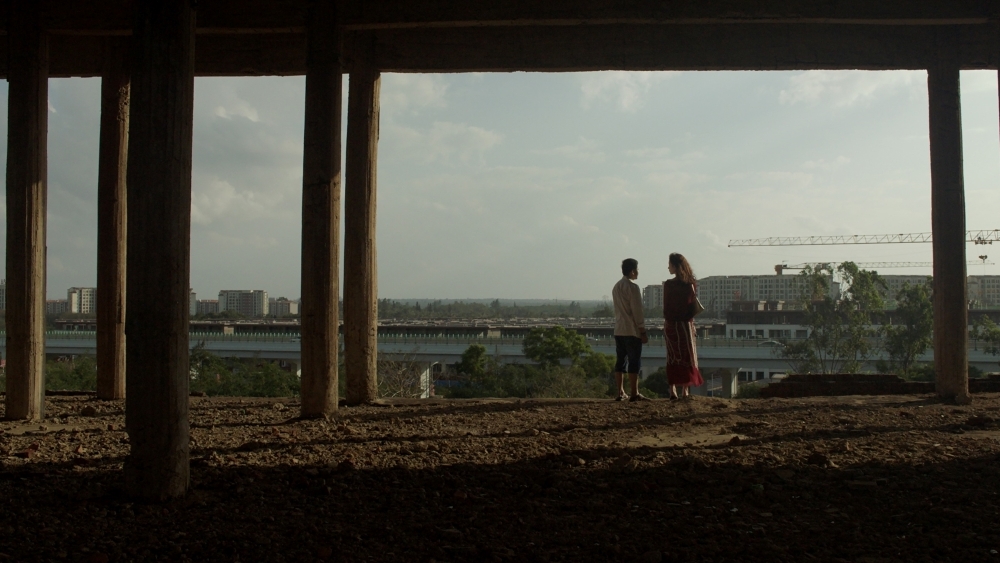
Sculptor turned director Wu Lang made a splash at the Berlin Film Festival with his debut feature “Absence” playing in the festival’s showcase Encounters section.
With a high-profile cast headed by Lee Kang-sheng (“What Time Is It There?” “The Wayward Cloud”) and Li Meng (“The Bad Kids,” “The Guillotines”) “Absence” is an art-house romance that uses skyscapes and urban landscapes as metaphors for inner feelings. The seduction starts with a man’s return to Hainan Island after ten years in jail and ends with a flock of sheep in an abandoned construction site.
Variety: This film has the same cast as your previous short film of the same title. In notes you’ve said that the two works are connected, but one is not an expansion of the other.
Wu: Shooting the first short film for me had two purposes. First, making a film is not easy in terms of financing and finding coproducers. So, first I wanted to make a short in order to get myself started.
My point is that the filming process is very precious to me. I didn’t want to simply make a short clip. I already wanted to focus on the relationship between the characters.
The construction of this story is actually my narrative about spatial change. I present the density of the relationship between the characters within the space.
When I was shooting the short, I discovered just how striking the inner landscape of the characters was as they travel through the space… Whether we are talking about the coconut forest or the clouds just before the storm arrives. In my film, I think everything is correlated with each other. Shooting the short film gave me a little more confidence in my cinematic exploration of this aesthetic.
Was this short-to-feature development particularly complicated? You took it to the HAF project market in Hong Kong.
We went to HAF in Hong Kong, but that was after the filming had taken place. So, it did not help with financing or pre-production. And I’d already invested my own money into the production of the film.
When most people think of Hainan, they typically think of China’s tropical island, all futuristic skyscrapers and hotels and the glamourous tourism of Sanya. But you show a very different side. What was your intention here?
On one hand, Hainan to me is a city that is very close to the sky. I first went to Hainan in 2009, and while I was living on a fifth floor, one day, when I looked out the window I saw a cloud passing by. I was convinced that it was a rocket ship. This experience triggered my visual imagination. I have lived in Hainan for about 10 years now.
There are actually two polar opposite sides of Hainan. One is the tall buildings and the tourist sites that you describe, complete with their growing pains. On the other hand, Hainan is actually a very slow city in terms of presentation and economics. These contrasts gave me plenty of food for thought. I wanted to contemplate on the middle ground between the fast and the slow.
It’s possible to view this film as a commentary on China’s current property sector crisis in which many buildings are not being completed and people are losing their deposits? You must have started this film before the crisis became manifest. How did how did you connect to this particular aspect of politics and society?
When we talk about this, we have to keep in mind just how important real estate is to Chinese citizens. And, significantly, this kind of problem had already emerged in Hainan 10-20 years ago. Their abundance and hostility are part of the heritage of this city.
Describe the look and the feel you were trying to present. For instance, it’s a film with not very much dialogue. It’s a film with some very interesting and curious camerawork, and at times, there’s even some surreal images.
When we talk about real estate issues or the absence of emotions in the film, we have to realise that there is always an underlying reality that is a different reality from the one that’s being presented.
What I wanted to achieve is to get close to the reality and the authenticity of the people in the film when they transition from one reality to the other. Through the aesthetics, I wanted to get closer to the characters’ inner mental landscapes.
Did your film have its Dragon Seal and all the approvals necessary for overseas exhibition?
Yes, we have all the approvals. In a sense, that’s progress for us.
In the last year, we have seen very few Chinese independent films travelling outside of the country. But there was half a dozen in Berlin. Is there a process that is now happening that is allowing films like this to travel again?
In the past few years COVID has been a really big factor, disrupting [the film industry]. My short film [also called ‘Absence’] travelled to Cannes in 2021. Now ‘Absence’ is in Berlin 2023. It’s great to see so many Chinese language films at Berlin this year. I hope that everybody can have more confidence in Chinese language cinema.
What do you mean by that use of ‘confidence’?
[Despite their absence from global screens] Chinese filmmakers have not stopped working. We kept moving forward.













